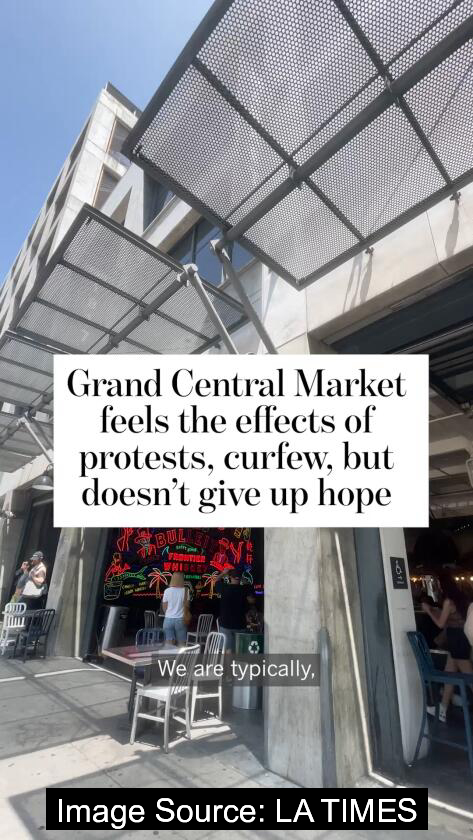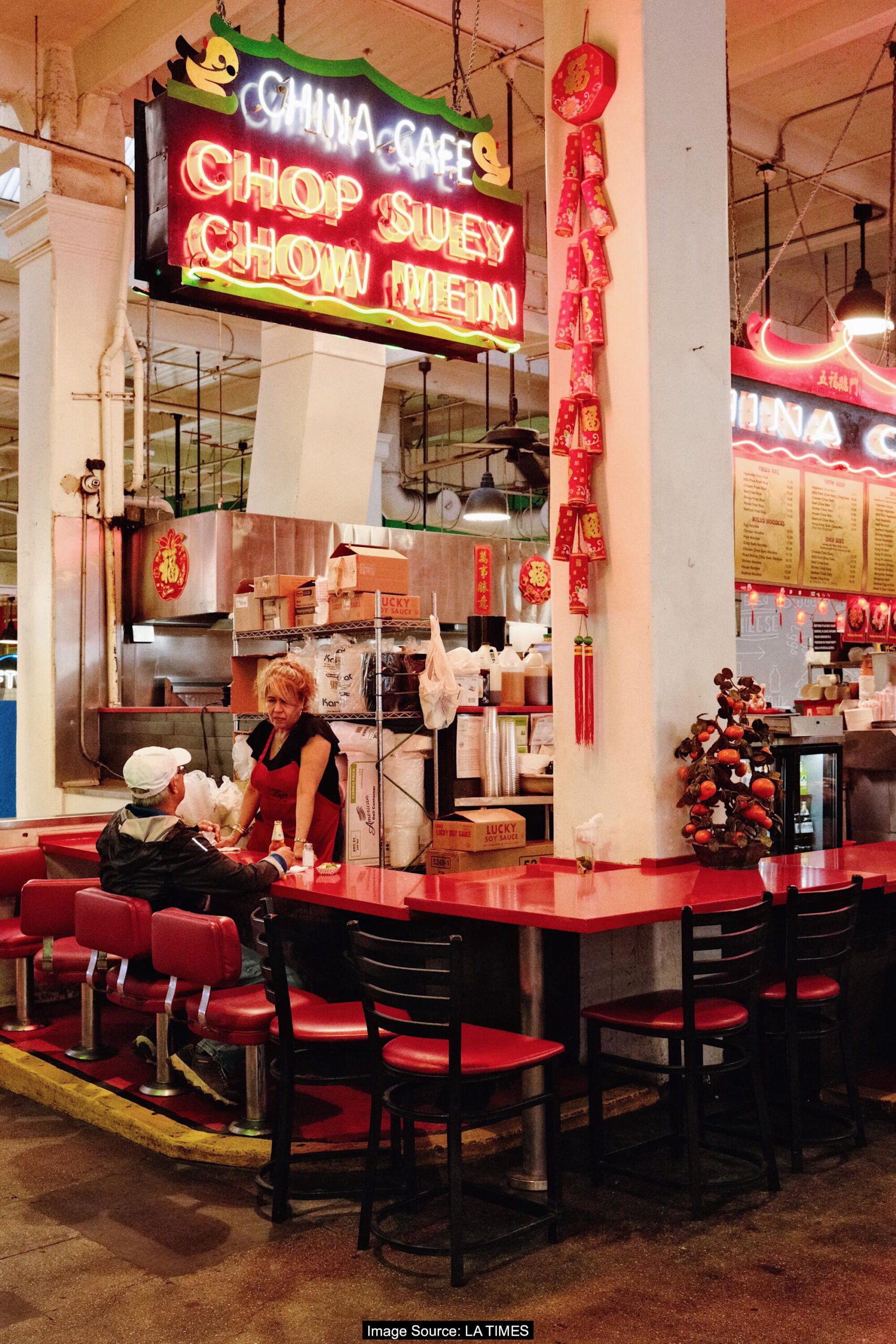Here’s a heartfelt and engaging introduction for the given title, within 300 characters, with a mix of and tags:
In the heart of Los Angeles, Grand Central Market stands as a vibrant tapestry, woven with the threads of immigrant stories and the flavors that have shaped the city’s culinary landscape. But now, this iconic institution faces a new challenge – navigating the climate of fear that has gripped the nation, as it strives to remain a beacon of diversity and inclusivity amidst uncertain times.

Immigrant-Owned Businesses Struggle Amid ICE Raids and Protests in Downtown LA
Historic Grand Central Market Sees Dramatic Drop in Customers
Normally bustling with tourists and downtown office workers, the historic food hall was nearly empty this week. Many vendors are closing early not only due to the week’s curfews, but simply a loss of customers. Here, the market’s staff and customers sound off on ICE raids, protests, and the impact on their businesses.
A Longtime Server’s Perspective
On Thursday afternoon, Martha Luna stood helping scant guests from beneath the iconic red neon signage at China Cafe, where she’s been a server for more than 40 years. Founded in 1959, it is one of the oldest legacy vendors in Grand Central Market. “The last few days, it’s been crazy,” she said from behind the red counter. “Everybody’s afraid, you know? When they come, they’re just talking about [how] they’re afraid to go out. Even if they go to the market or eat, they’re so afraid, even my boss.”

Newer Vendors Also Impacted
A Taqueria’s Struggle
Some of the newer, flashier vendors also noted a dramatic drop in business. Amy Recinos at Villa’s Tacos said, “We are typically one of the vendors that stays very, very busy throughout the entire week and day.” But this week, Villa’s is closing early due to lack of business. Recinos spoke with some of the restaurant’s regulars, most of whom work in the neighborhood and told her they’re working from home “to avoid the riots and to avoid the protests.”
Serving Protesters
On Sunday, the stand found most of its customers to be protesters, and Recinos expects that to be the case this weekend. “To all of my Hispanic immigrants: I’m here for you, we see you,” she said.

The Impact on the Community
A Staple of the Immigrant Experience
In a way, the market, with its oldest stalls ranging from Mexican to Chinese to Salvadoran cuisines, is an embodiment of the immigrant experience in Los Angeles. But this week, even at what are typically its peak hours, tables sat empty. The legendary market, like so many other restaurants and businesses across downtown, is losing business due to Immigration and Customs Enforcement raids and the neighborhood’s anti-ICE protests.
Uncertain Times Ahead
The historic food hall, a beloved institution in the heart of downtown LA, is facing uncertain times as the community grapples with the impacts of immigration enforcement and civil unrest. The stories of the market’s staff and customers reflect the broader challenges immigrant-owned businesses are navigating in this turbulent period.
Personal Reflection
Reading about the struggles faced by the vendors and staff at Grand Central Market was truly eye-opening. As an immigrant myself, I felt a deep connection to their experiences and the sense of fear and uncertainty they are grappling with. It’s heartbreaking to see a vibrant, multicultural hub like the market suffer such a dramatic downturn in business due to factors beyond their control.
What struck me most was the resilience and compassion of people like Martha Luna and Amy Recinos, who are doing their best to support their communities during these difficult times. Their stories remind me of the vital role immigrant-owned businesses play in shaping the fabric of our cities and the importance of standing in solidarity with those facing adversity.
This blog post has reinforced my belief that we must continue to advocate for just and humane immigration policies that protect the rights and livelihoods of all people, regardless of their background. By amplifying the voices and experiences of those on the frontlines, we can work towards a more inclusive and equitable future for all.
Keywords
foot
English translation: foot
Example sentences:
– I have a sore foot from walking all day.
– The table has four sturdy feet to keep it stable.
Detailed explanation: The word “foot” refers to the lower extremity of the human body that is used for standing, walking, and balancing. It consists of the ankle, heel, and toes, and is an essential part of the body’s locomotion system.
each
English translation: each
Example sentences:
– Each student in the class received a new textbook.
– I have two dogs, and each one has a different personality.
Detailed explanation: The word “each” is used to refer to individual members of a group or set. It indicates that the action or characteristic applies to every single item or person in the group, rather than the group as a whole.
Here
English translation: here
Example sentences:
– Please put the book down here on the table.
– I’ve been waiting for you here at the park for an hour.
Detailed explanation: The word “here” is used to indicate a specific location or place, usually the one where the speaker or the listener is currently situated. It is a spatial adverb that helps to specify the proximity or position of something in relation to the speaker.
empty
English translation: empty
Example sentences:
– The refrigerator is empty, so we need to go grocery shopping.
– The auditorium was empty, as the event had already ended.
Detailed explanation: The word “empty” describes something that is devoid of content or occupancy. It suggests a lack of substance, possession, or presence within a particular space or container.
uncommon
English translation: uncommon
Example sentences:
– The artist’s unique style is quite uncommon in the local art scene.
– It is uncommon to see such a large flock of birds in the city.
Detailed explanation: The word “uncommon” means something that is not typical, frequent, or widely seen. It suggests a sense of rarity or uniqueness, implying that the subject matter is not commonly encountered or experienced.
Encouraging words for language learners: Keep up the great work in your language learning journey! Consistent practice and a positive mindset are key to improving your skills. Remember, every step forward, no matter how small, is progress. Stay motivated, and don’t be afraid to make mistakes – they are a natural part of the learning process. You’ve got this, so keep studying hard and believing in yourself. Wishing you all the best in your language learning endeavors!